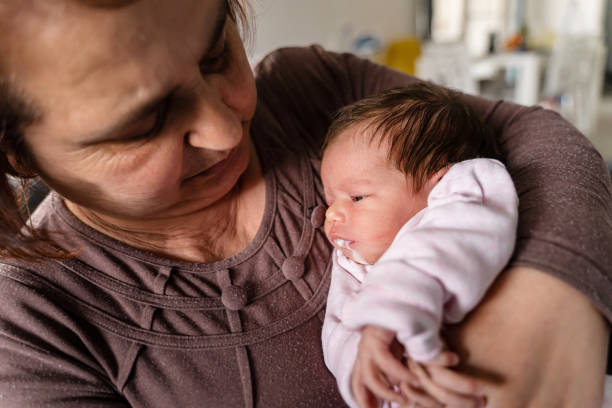What are the Causes, Symptoms, and Management for Colic in Babies?
Research by NIH has revealed that slightly above 20% of newborn babies experience infantile colic. The number could be higher, going by the cries emanating from houses with newborns. As a parent, you might wail with the baby when the colic kicks in. To understand this mysterious condition that babies get, let us start with the basics.

What is Colic?
Colic is a situation where a baby breaks into wailing, sobbing, and arching their backs for more than three hours a day. There is so much mystery surrounding colic in babies, going by these observations:
- Colic babies get fussier in the evenings.
- Colic does not discriminate whether a baby is breastfed or bottle-fed.
- Colic does not knock; the baby cries without any triggers.
- Most babies get over colic by 6 months.
- It is hard to rock, pamper, and calm colicky babies.
- Colic does not affect a future baby’s growth.
When Does Colic Start?
Every baby is different; I have mentioned that for the umpteenth time. In some cases, colic might start when the baby is a few days old, while in other cases, the colic starts at 3-6 weeks. Babies born prematurely are prone to getting colic.
What Causes Colic in Babies?
In my article on common issues that newborn babies face, I mentioned that colic remains a mystery, which I still hold. There are so many theories developed to explain the causes of colic, which remain as they are; theories.

These are the major common theories that try to explain the possible causes of colic in babies:
1. Growing Digestive System

Proponents of this theory hold that babies are sensitive to what enters their tiny belly due to the underdeveloped digestive tract. As a result, babies get allergies from breastmilk, and other fluids that get into the stomach.
2. Gas or Constipation
According to this theory feeding babies swallow gas which gets entrapped into the stomach. The gas causes discomfort to the baby, making them get colicky. Additionally, this theory holds that the food that a mother takes might adversely affect the quality of milk produced, which might trigger colic.
3. A Form of Migraine
Migraine is an unpleasant condition that leaves your head feeling like it’s been hit by a rocking ball. Could you imagine what the same migraine could do to an infant? There is no proven study to show that babies get migraines, but that is a possible theory on the cause of colic.
4. Developing Nervous System

The nervous system is a delicate part of the human body that controls almost all functions. Babies have an underdeveloped nervous system, which can easily be affected by external factors, making them develop colic.
Additionally, the underdeveloped nervous system means babies cannot self-soothe, hence the colic.
Other possible causes of colic in babies include sensitivity to noise or light and hormones transferred from the mother.
Infant Acid Reflux

In my article on the causes of infant acid reflux, clinically known as gastroesophageal reflux disease (GERD), I tackled its symptoms, similar to colic. GERD comes as a result of an underdeveloped lower esophageal sphincter, which might irritate the esophagus making babies throw up more often, especially when you burp them. GERD also lowers babies’ appetite and might affect their growth.
What are the Symptoms of Colic in Babies?
These are some of the colic symptoms to look out for:
- The Rule of 3
Colic in babies mostly follows the rule of three, which consists of:
- Crying for at least 3 hours a day.
- Breaking into cries at least three times a week.
- Crying for at least three weeks.
- Consistency in the crying time
Most of the colicky cries set out at specific times, especially in late afternoons or early evenings.
- Tell-tale Signs
There are easily observable signs that colicky babies show. They can shut their eyes, open them wide while screaming, and even furrow their brows. In some cases, the babies might hold their breath briefly while crying.
- Increased Bowel Movement

Most babies experience an increased bowel movement during the colic episodes. The increased bowel movement fueled the theory that the underdeveloped digestive tract could cause colic. In some cases, an increased passing of gas accompanies the increased bowel movement.
- Body Language
You can easily tell that your baby is having colic by how they move their tiny hands. Colicky babies might clench their fists, stiffen their arms, arch their back, get tensed abdomen, and appear to have a red face.
- Excess Fussiness
A colic baby gets easily triggered even after the crying episode has subsided. It becomes hard to handle them since they break down easily when you “mishandle” them.
Does Gripe Water Reduce Colic in Babies?

The mystery surrounding colic has led to the formation of equally mysterious treatments, with gripe water topping the chart. The discussion on using gripe water to treat colic pops up in parenting talks.
Some parents argue that giving their colicky infants gripe water eased their lives and made parenting a little bit easier. Several international bodies such as the FDA have been reluctant to accept gripe water as a possible solution to colic in babies.
What is the Treatment for Colic?
There is limited information on the causes of colic in babies and it is therefore hard to administer any treatment. However, these tips can help parents to soothe colicky infants:
Keep the infants full, but avoid overfeeding them. This article will tell you when you are overfeeding the baby.
- Constant change of your baby’s sleeping position.
- Frequent massage to the baby’s tummy and back when they get fussy.
- Find out from your doctor if your medication or food might be reacting with the baby.
- Swaddle your baby before taking them to sleep. There are so many benefits of swaddling.
- Keep your baby busy with lullabies when they are sleepy or fussy.
- Give the baby a warm bath and gently stretch their arms and feet frequently.
- Rock the baby on your lap or swing frequently.
Parenting Tips on Coping with Colic

Colic can easily send mothers into post-partum depression and it is therefore prudent to devise coping mechanisms. These tips will help you manage the challenges that come with colic in babies:
A. Divide Labor
Taking care of a baby is an uphill task in itself, not to mention a colicky one. If you have a partner, let them help you out and take care of the colicky baby.
You can even take shifts in tending to the baby to avoid fatigue or in worse cases, breaking down.
B. Go Savage
As a new parent, the wails of your colicky can make you get depressed, especially if you have no helping hand. In this case, what do you do? There are several, “not-so-demure” ways that you can use to calm your nerves.
You can put on noise-canceling pods or music on earphones. Although doing this does not stop the baby from crying, it might give you the temporary peace you need.
C. Take a Break
You love the baby, right? How about loving your mental well-being as such? It is also okay to take a 5-10-minute break to cool off your mind, especially when the colic goes full swing.
D. Speak
Most mothers break down and sink into PPD for keeping it to themselves when they face challenges. Be free and talk to your partner, therapist, or pediatrician about the colic. If you must, cry! There is no trophy for bottling up the pain of your little world giving you sleepless nights with colic.
When To See a Doctor for Colic
There are instances when you should see a pediatrician to assess your baby’s colic. First, if you feel your baby is crying excessively, see a pediatrician. The pediatrician will diagnose your baby for any underlying condition(s) causing the excess crying.
Explicitly describe to the pediatrician the baby’s crying patterns, the sounds they make when crying, and the period they have been crying.
My son nearly made me go nuts. But here we are; almost clocking one and a half years. This too, shall pass. Take a step at a time. You will eventually make it and will look back with gratitude that you pushed on, even on days when you felt you could not.


